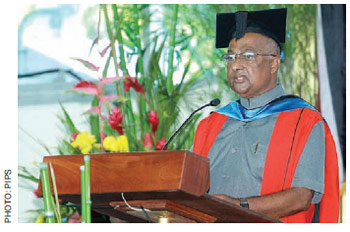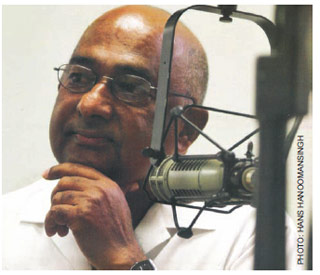|
December 2010

Issue Home >>
|
A golden voice 
“I wish to point out that the suppression of a people’s culture, whatever the reason, cannot build a nation, regardless of inspirational tenets in anthems and speeches on national occasions.”
–Hans Hanoomansingh addressing graduating students of the Faculty of Humanities and Education
This is the citation for the conferral of the degree of Doctor of Laws, honoris causa on Hans Hanoomansingh, delivered by the Public Orator of The UWI, Professor Surujpaul Teelucksingh at the graduation ceremony on October 30, 2010.
Chancellor, no one will blame you for not having any idea of where Cunupia stands. For it is neither north nor south, nor east nor west. It is not even central. Indeed that honour is singularly Chaguanas, the Naipaulian town just three miles to the south. Cunupia is neither Indian nor African. Yet for all its undifferentiation and apparent confusion, today our University in all its wisdom has singled out a quintessential Cunupian for celebration: Hans Hanoomansingh, one of Cunupia’s most illustrious sons. When the air was pierced by the shrill cry announcing his birth, there would have been little indication of the voice that was in time to emerge.
Chancellor, it may have taken 70 million years of evolution to create the human voice but it took Hans Hanoomansingh two decades to perfect it. For when he speaks it is as if melody wafts from some magical flute. But Chancellor, a pair of gilt-coated vocal cords is an innate and God-given gift and it would require much more to derive the honour that is about to be bestowed upon him here today.
So what brings this Cunupian before you? It is simply because he has led a prodigious life dedicated to journalism in radio and television. And as a journalist he was as versatile as he was competent – having worked as an announcer, producer, editor, news analyst and as anchor of then Trinidad and Tobago Television’s flagship news programme, “Panorama”. During his illustrious career he has interviewed hundreds of personalities, including South Africa’s indefatigable anti-apartheid warrior, Bishop Desmond Tutu and Calcutta’s angel of mercy, Mother Teresa.
 He has produced, narrated and directed an enviable list of documentaries on people including all our past Presidents. Some use the airwaves to divide but he has used it to build – reconstructing lives of citizens and places. His pioneering programme “From the Silver Screen” was the most listened to programme on radio in the 1960s. He could produce documentaries on subjects as diverse as the Sanatan Dharma Maha Sabha and the Spiritual Baptists; Christmas and Divali. This speaks of an ecumenism that is surprising for one who grew up in a remote village 50 years ago. He has produced, narrated and directed an enviable list of documentaries on people including all our past Presidents. Some use the airwaves to divide but he has used it to build – reconstructing lives of citizens and places. His pioneering programme “From the Silver Screen” was the most listened to programme on radio in the 1960s. He could produce documentaries on subjects as diverse as the Sanatan Dharma Maha Sabha and the Spiritual Baptists; Christmas and Divali. This speaks of an ecumenism that is surprising for one who grew up in a remote village 50 years ago.
This ecumenical spirit must have arisen very early and from a most peculiar but highly advantageous spot. His home lay just opposite the Hassarath Road cemetery. This unofficious space was encircled by places of worship: the Roman Catholic Church to the east, a Spiritual Baptist tabernacle to the west and Mr Shoonon’s home – hardly a house – but a place where two to three hundred would congregate to hear stories from the “Ramayan.” In that village and from his perch on a front gallery, surrounded by places of worship and overlooking the cemetery, he would have a first-hand view to gain an invaluable lesson; that whatever our station in life, how equal we are when the journey ends!
Doubtlessly a consummate professional, it is his unparalleled contribution to culture that stands him apart. The 1990 award of a Hummingbird Gold Medal recognised his long and meritorious service in the areas of culture and broadcasting.
The Divali Nagar is but a lasting legacy of his vision, for 25 years after he first conceptualised and initiated this endeavour, it continues to flourish and to attract tens of thousands of participants annually to a place and a space for cultural expression. Its impact on the cultural landscape was recognised by Prime Minister Basdeo Panday in an address in 2000 when he remarked: “Few gifts of greater value have been given by a single citizen to this nation, this region and this hemisphere, than this wondrous annual Divali Nagar celebrations. Hans Hanoomansingh deserves his nation’s gratitude and our lasting love for the enduring service he has given to the people of Trinidad and Tobago. One of the striking achievements of Hans Hanoomansingh’s life of service is that while he has earned wide renown as the President of The National Council of Indian Culture, he has been a significant crusader for multiculturalism in our society.”
His may seem simply a story of repeated triumph but there was early tragedy when, at age 11, he lost his father. His early years though harsh, could have been worse, were it not for a discerning primary school teacher who spotted his talent and encouraged him to recite on stage. It is truly amazing that an act so casual and seemingly insignificant could have such profound consequences. For when just a teenager with an incomplete education and the need to become a provider, he turned to public broadcasting, emboldened by the confidence shown in him by this primary school teacher. This message should not be lost on all teachers for they hold that immense power to shape and mould the future. have been worse, were it not for a discerning primary school teacher who spotted his talent and encouraged him to recite on stage. It is truly amazing that an act so casual and seemingly insignificant could have such profound consequences. For when just a teenager with an incomplete education and the need to become a provider, he turned to public broadcasting, emboldened by the confidence shown in him by this primary school teacher. This message should not be lost on all teachers for they hold that immense power to shape and mould the future.
He was also to tempt fate when in 1966, at age 24, he went into national politics and became the youngest member of parliament in the Commonwealth. But he must have quickly become aware of the charms and dangers of politics. For aren’t we warned that all successful political careers end in failure? With this in mind, he quietly exited after a single term and turned instead to promotion of local culture.
Chancellor, when you rise to honour him you are recognising a Cunupian who has excelled as a broadcaster, cultural activist and businessman and who would want it to be said, very loudly, that he will graciously accept this most outstanding honour in the name of all single mothers like his own and of all primary school teachers like Mr Kenneth Phillips (RIP) who silently and often thanklessly, sow the seeds of greatness in young citizens.
Many make a life by what they get but Hansley Hanoomansingh has, by what he has given. And so, by the power vested in you by the Council and Senate of our beloved University, I invite you, Chancellor, to confer upon one of Cunupia’s favourite and most beloved sons, the degree of Doctor of Laws, honoris causa.
|





